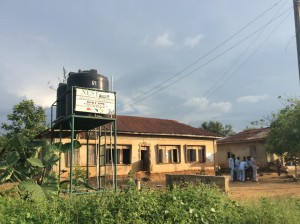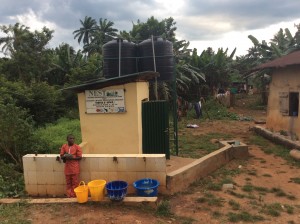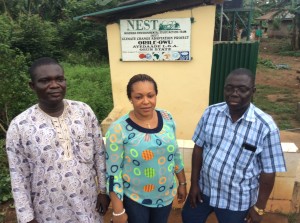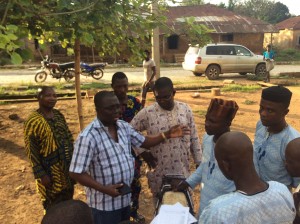Rural communities in six states and the Federal Capital Territory (FCT) are being offered a helping hand in their bid to cope with the vagaries of the warming weather and it’s damning consequences.

In the light of the nation’s vulnerability to the impacts of climate change, local folks in Kwara, Osun, Imo, Kogi, Gombe and Cross River states along with the FCT are receiving state-of-the-art boreholes, equipped with rainwater harvesting facilities, transformed with climate-smart agricultural practices and trained on the use and benefits of the Moringa plant as well as other alternative livelihood ventures.
The initiative, which is a pilot project that will eventually be replicated nationwide, comes largely under the Japanese government-sponsored Africa Adaptation Programme (AAP), which is being executed in conjunction with the Federal Ministry of Environment (FMoEV) and United Nations Development Programme (UNDP).
Over the weekend, a team comprising officials of the Department of Climate Change in the FMoEV and Nigerian Environmental Study/Action Team (NEST) inspected borehole facilities in Orile-Owu, Ayedaade Local Government Area (LGA), Osun State.
Director, Department of Climate Change, FMoEV, Dr Samuel Adejuwon, said: “The project is aimed at helping the communities to adapt to the impact of climate change. Ordinarily, the residents travel several kilometres to access potable water, and this is during the rainy season. During the dry season, water sources get dried up completely, making it even more challenging for them to have access to water.

“So by siting this borehole makes water available at any point during the year, whether during the dry or wet season. Also, they are sure of the quality of water they are taking from the borehole because it is not contaminated. Besides coming from the ground, the tank is occasionally washed. So there is constant supply of quality water for domestic use.”
According to Adejuwon, other projects undertaken to adapt to climate impacts include rainwater harvesting, climate-smart agriculture in Aguatu LGA in Imo State whereby a very large percentage of land is cultivated for rice with water, weather station and other supporting facilities are provided.
He added: “We hope to replicate this in other parts of the country. Nigeria is very vulnerable to the impacts of climate change hence the execution of projects like this to ease the natural process of adaptation. We also have projects in Kwara, Enugu, Kogi, Imo and Cross River states and the FCT. These ones are being done under the Japanese government-sponsored AAP project. These are pilot projects. We want them to be sustained, the little capital projects, and get fish famers also involved in adaptation projects. We have done feasibility studies in some states but we are being held back by limited funding. We are also venturing into climate-smart agriculture, which involves a lot of funding.”
Isaac Oloogunebi, Finance & Admin. Manager at the Nigerian Environmental Study/Action Team (NEST) which, under a consultancy capacity, renovated and converted the two boreholes to motorised pump. They became operational in October 2012, but were commissioned May 2013.

Oloogunebi listed other projects to include those at Kwara State (provision of portable water), Kogi and Imo states, and FCT (rainwater harvesting and training on water, sanitation & hygiene – WASH management), Cross River (alternative livelihood: aqua culture centre and fishpond) and Gombe State (training on Moringa use and rainwater harvesting).
Ijaduola Sikiru, Secretary to the Committee Maintaining the Project at Orile-Owu, disclosed that the facility is being properly maintained from the stipend charged, which is N10 for 20 litres bowl or keg of water.
Sikiru, who is a farmer, stated that the project has positively impacted the environment, adding that more females than males participated in the planning, execution and monitoring of the project as well as contributed more to resources that ensured its realisation and upkeep. He added that females compared with men have more access to the services provided by the project.
According to him, the average time spent fetching water has reduced from about 45 minutes trip to the community stream to just two to five minutes to get to the water facility, adding that there has been no reported cases of water borne diseases since the facility became operational.

Fasasi Nurudeen, another farmer in Orile-Owu, revealed that about 100 people daily fetched water for domestic use from the facility before it was rehabilitated. He added the number has since doubled following its upgrading.
Saying that the entire community is now being served by the facility, he expressed satisfaction with the degree of the community’s participation in the adaptation project’s processes, as well as the resources made available and quality of work done.
